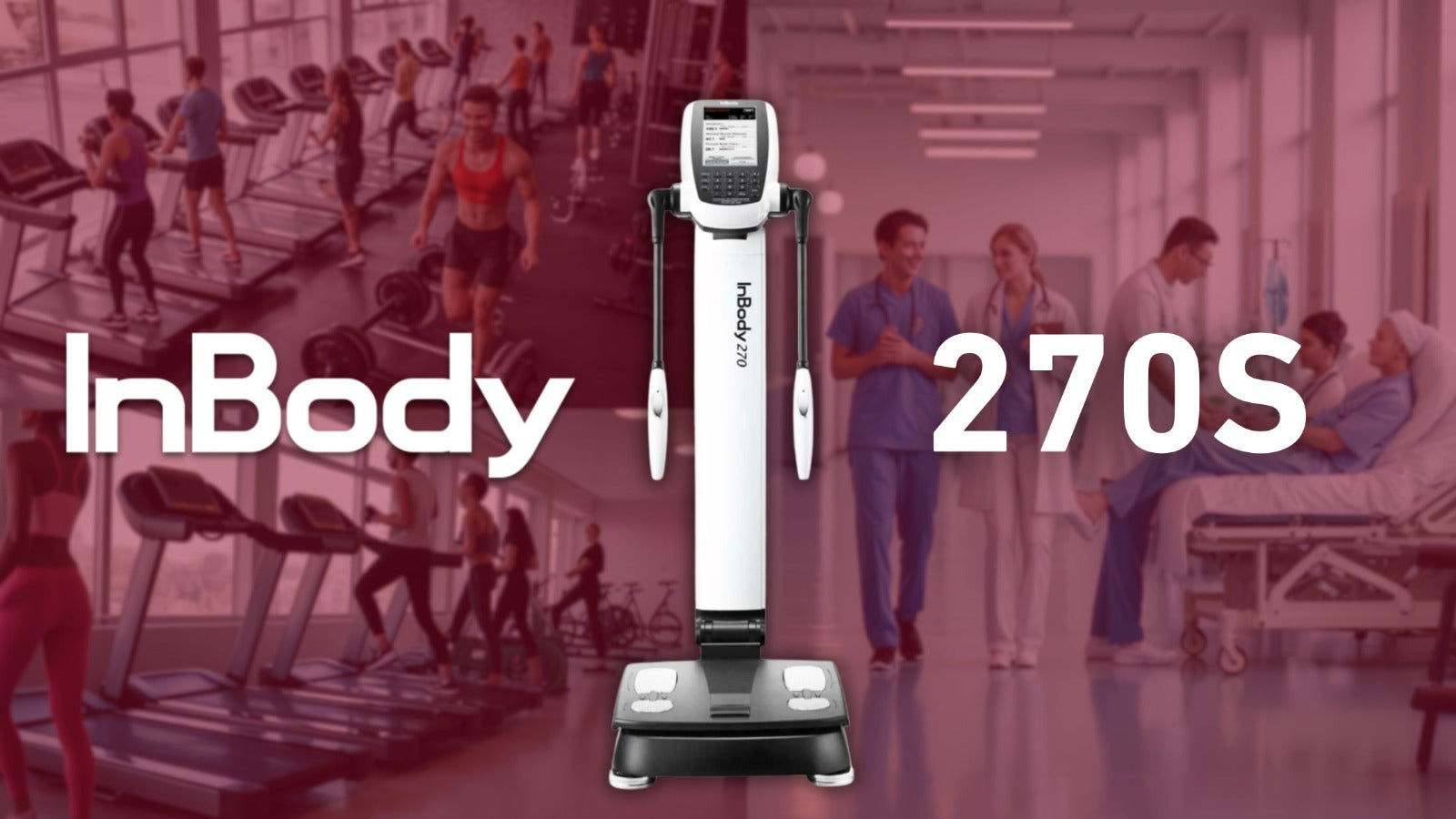Body composition analysis has evolved into a critical tool for understanding overall health and fitness. As more people turn to technology to track their wellness, the demand for reliable and accurate body composition analyzers has risen.
InBody, a leading name in this field, offers several devices tailored to meet various needs—from personal wellness to professional environments. One of their top models, the InBody 270s, stands out as a versatile, portable solution for body composition analysis. In this review, we’ll dive deep into its features, accuracy, pricing, and compare it with the InBody 120, another popular model.
InBody 270s Review: Features and Specifications
The InBody 270s is a compact and portable body composition analyzer designed for both professional and personal use. InBody body composition analyzers are versatile tools used in a wide range of settings.
In healthcare clinics, they provide physicians with accurate data for diagnosing nutritional deficiencies and managing chronic conditions. Sports and fitness centers leverage these devices to optimize training and track athletic performance, while weight management and wellness clinics use them to design personalized diet and exercise plans.
Rehabilitation centers employ InBody 270s analyzers to monitor recovery progress and prevent muscle loss, and research institutions utilize them to explore trends in body composition and health outcomes. Corporate wellness programs and even individual home users benefit from these precise insights, making proactive health management accessible for everyone.
Let’s explore its key features and specifications:
Technology and Measurement
Like other InBody models, the InBody 270s uses Bioelectrical Impedance Analysis (BIA) with an 8-point tactile electrode system. This advanced system measures body segments separately, ensuring greater accuracy and precision. It can measure multi frequencies of 20, 100 kHz.
Parameters Measured
The InBody 270s provides an extensive range of body composition metrics, including:
-
Total body water
-
Protein and mineral mass
-
Skeletal muscle mass
-
Body fat mass and percentage
-
Visceral fat level (VFA)
-
Basal metabolic rate (BMR)
-
Segmental lean analysis
-
Obesity evaluation
-
Nutrition evaluation
-
Phase angle measurement (for assessing cellular health)
Portability and Design
The InBody 270s is lightweight and portable, making it easy to move between professional environments and home use. Its design includes a user-friendly touchscreen interface for easy navigation, providing results in less than a minute.
Data Management
The device syncs with the InBody app, allowing users to track, analyze, and store results over time. This is crucial for individuals monitoring their health progress or fitness professionals managing multiple clients.
Power Source and Connectivity
The InBody 270s is powered via an AC adapter and supports Bluetooth & Wi-Fi for wireless data transfer for offering excellent flexibility and ease of use.
How Accurate is the InBody 270s?
When choosing the best body composition analyzer, accuracy is paramount. The InBody 270s excels in this department, thanks to its direct segmental measurement, which provides more reliable results compared to traditional methods that rely on general estimates.
Direct Segmental Measurement
The InBody 270s provides precise measurements by analyzing each body segment individually, such as arms, legs, and torso.
No Empirical Data Dependency
The device does not rely on assumptions based on age, gender, or ethnicity. Instead, it assesses each person’s unique electrical conductivity, which leads to more accurate and reliable results.
Validated Testing
InBody devices, including the 270s, have been validated through numerous clinical studies, making them trusted tools for professionals in various health and fitness fields.
A study “Body Composition Assessment: A Comparison of the DXA, InBody 270, and Omron” shows that no significant differences between InBody 270 and DXA in any body composition measure. InBody 270 showed similar results to DXA for fat mass and body fat percentage. DXA is considered a gold standard but is costly, while InBody 270 offers a more affordable alternative.
InBody 270s vs. InBody 120: Key Differences
Both the InBody 270s and InBody 120 are excellent options for users who prioritize accuracy and comprehensive body composition data. However, there are notable differences that may influence your decision:
Advanced Features
The InBody 270s offers more detailed analysis than the InBody 120, including obesity and nutrition evaluations, phase angle measurement, and more advanced data tracking features.
Data Management
While both devices sync with the InBody app, the InBody 270s supports Wi-Fi connectivity in addition to Bluetooth, offering more robust data management options.
Outputs:
InBody 270s outputs:
-
Body Composition Analysis (Total Body Water, Dry Lean Mass, Body Fat Mass, Weight)
-
Muscle-Fat Analysis (Weight, Skeletal Muscle Mass, Body Fat Mass)
-
Obesity Analysis (Body Mass Index, Percent Body Fat)
-
Segmental Lean Analysis (Right Arm, Left Arm, Trunk, Right Leg, Left Leg)
-
Body Composition History (Weight, Skeletal Muscle Mass, Percent Body Fat)
-
Body Fat—Lean Body Mass Control
-
Lean Body Mass
-
Basal Metabolic Rate (BMR)
-
InBody Score
-
Skeletal Muscle Index (SMI)
-
SMI History
-
Blood Pressure (Systolic, Diastolic, Pulse, Mean Arterial Pressure, Pulse Pressure, Rate Pressure Product)
-
Sarcopenia Parameters
-
Results Interpretation QR Code
-
Impedance (Each Segment and Each Frequency)
InBody 120 outputs:
-
Body Composition Analysis (Total Body Water, Protein, Minerals, Body Fat Mass, Weight)
-
Muscle-Fat Analysis (Weight, Skeletal Muscle Mass, Body Fat Mass)
-
Obesity Analysis (Body Mass Index, Percent Body Fat)
-
Segmental Lean Analysis (Right Arm, Left Arm, Trunk, Right Leg, Left Leg)
-
Segmental Fat Analysis (Right Arm, Left Arm, Trunk, Right Leg, Left Leg)
-
Body Composition History (Weight, Skeletal Muscle Mass, Percent Body Fat)
-
InBody Score
-
Weight Control (Target Weight, Weight Control, Fat Control, Muscle Control)
-
Research Parameters (Basal Metabolic Rate, Waist-Hip Ratio, Visceral Fat Level, Obesity Degree)
-
Results Interpretation QR Code
-
Impedance (Each Frequency, Each Segment)
Note: Blood Pressure and Sarcopenia Parameters outputs are only available when used in conjunction with select InBody Blood Pressure devices and InBody Hand Dynamometer devices.
InBody 270s Review: Conclusion
The InBody 270s is an outstanding body composition analyzer that blends portability with professional-grade features. It is ideal for users who need in-depth, reliable body composition analysis in various settings—from fitness centers to homes.
The added capabilities of obesity evaluation, nutrition insights, and phase angle measurement set the InBody 270s apart from other models like the InBody 120, which focuses on core metrics like body fat percentage and muscle mass.
For fitness professionals, wellness centers, and health-conscious individuals who need a versatile, accurate device with advanced features, the InBody 270 is an excellent choice. While it may be priced higher than the InBody 120, the investment is justified by the enhanced functionality and more robust data management options.

